関税の応酬とは?
この風刺画について
この風刺画「関税の応酬」は、アメリカのトランプ大統領を発端とした国際社会における関税政策のエスカレーションと、それに伴う経済的・外交的な緊張をテーマに描いた作品です。
国々が関税という“武器”を使い、お互いに声を張り上げて非難し合う様子を、皮肉とユーモアを込めて表現しました。
TOPの風刺画は3つの場面に分かれています。
左の風刺画では、二つの国がメガホンで「TARIFF!(関税!)」と叫び合い、背後にはそれに呼応するように他国の代表者たちが次々と声を上げています。
中央の風刺画では、世界地図を囲んだ各国の首脳が、怒鳴り合いながらも互いの陣営を強調しています。
地図には各国の国旗が表示され、地政学的な緊張と利害関係の複雑さが視覚的に表現されています。
右の風刺画では、世界中の国々が一斉に叫び声をあげており、もはや“対話”ではなく“騒音”と化している様子を描きました。
このように、国と国とのあいだで始まった貿易摩擦が、どれほど速く連鎖的に広がり、最終的にはグローバルな対立構造へと発展してしまうのかを、視覚的に象徴させたのです。
この風刺画は、単にアメリカのトランプ大統領を発端とする国際関係の緊張を描くのではなく、「外交という名のゲームが、いつの間にか感情的な叫び合いになってしまっていないか?」という疑問を投げかける意図を持っています。
私たちはしばしば、経済政策を巡る争いの裏にある人間的なエゴやプライドを見過ごしがちです。
本作は、そうした本質に光を当てたいという思いから生まれました。
風刺画のポイント
この風刺画において、最も重視したのは「声の大きさと伝達手段」の表現です。
風刺画において“叫び”は言葉よりも多くを語ります。
そこで私は、登場人物たちが怒鳴る姿勢や口の大きさ、手振り、顔の赤らみまで細かく描き込むことで、緊張と憤りの臨界点を視覚的に示しました。
これは単なる誇張ではなく、外交の場が感情に支配される危うさをあらわす演出です。
特にこだわったのは、各国の代表者たちが使うメガホンやスピーカーの表現です。
メガホンは「一方的な発信」、つまり“対話不在”の象徴です。
また、スピーチバブルに「TARIFF!!」と何度も描かれているのは、もはや本質的な議論ではなく、ただの言葉の応酬に堕している様子を皮肉っています。
違う言語で叫んでいるにもかかわらず、意味はすべて「TARIFF」。この統一感には「どの国も同じような振る舞いをしている」という揶揄を込めました。
中央の風刺画の地図上には、各国の国旗をモザイク状に並べました。
これは経済がグローバルにつながっている現代において、一国の関税政策が全体に波及するという“バタフライ効果”を表しています。
また、地図を囲んで怒鳴り合う構図は、国際会議の場でありがちな「空転する議論」を暗示しており、誰一人として冷静に耳を傾けていないという構造的問題も描いています。
さらに、右端のパネルでは、世界地図の外にまで飛び出して叫ぶ人物を描いており、もはや争いのスケールが“国家間”を超えて“地球規模”になっていることを示唆しています。
その人物たちは、顔や服装こそ違えど、皆同じように怒鳴り、同じ言葉を繰り返しています。
これは、ナショナリズムや経済保護主義がどれだけ普遍的な現象かを表現するための技法です。
最後に、タイトルの「関税の応酬」という言葉には、直接的な意味にとどまらず、「言葉の応酬」や「感情の応酬」というニュアンスも含ませています。
英語表記の「Tariff Retaliation」も、ただの経済用語としてではなく、“報復”という言葉が持つ負の連鎖のイメージを意識しました。
この風刺画は、政策の是非を問うものではなく、「その議論の仕方」に疑問を呈するものです。
もしこの風刺画を見た方が、現実のニュースに重ねて一瞬でも“静寂の必要性”を感じていただけたなら、それが私にとっての最大の報酬です。
AIが描いた「関税の応酬」
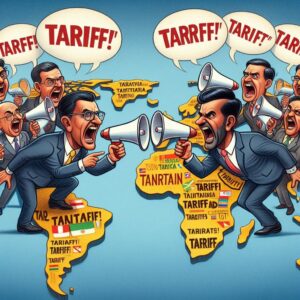 |
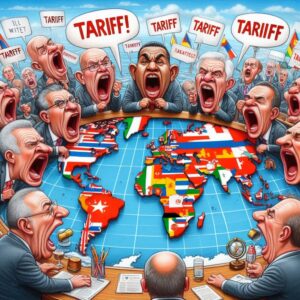 |
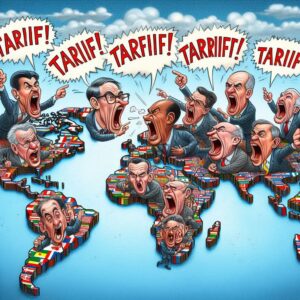 |
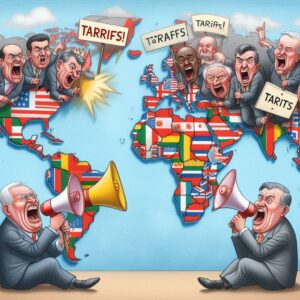 |
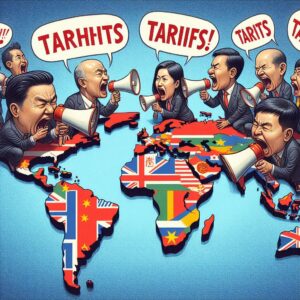 |
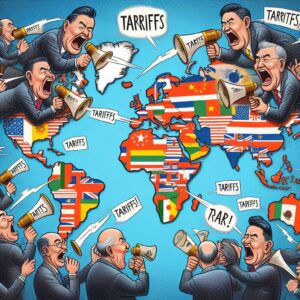 |

コメント